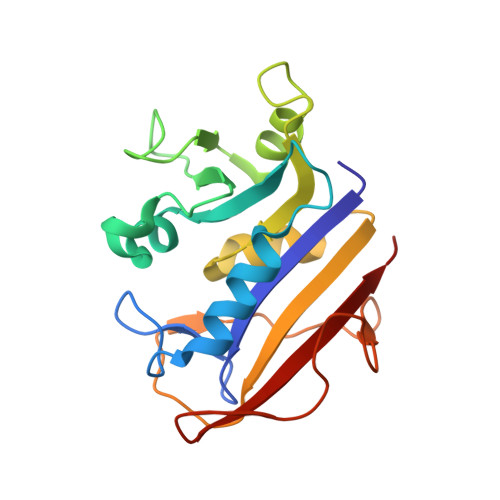Elucidating features that drive the design of selective antifolates using crystal structures of human dihydrofolate reductase.
Lamb, K.M., G-Dayanandan, N., Wright, D.L., Anderson, A.C.(2013) Biochemistry 52: 7318-7326
- PubMed: 24053334
- DOI: https://doi.org/10.1021/bi400852h
- Primary Citation of Related Structures:
4KAK, 4KBN, 4KD7, 4KEB, 4KFJ - PubMed Abstract:
The pursuit of antimicrobial drugs that target dihydrofolate reductase (DHFR) exploits differences in sequence and dynamics between the pathogenic and human enzymes. Here, we present five crystal structures of human DHFR bound to a new class of antimicrobial agents, the propargyl-linked antifolates (PLAs), with a range of potency (IC50 values of 0.045-1.07 μM) for human DHFR. These structures reveal that interactions between the ligands and Asn 64, Phe 31, and Phe 34 are important for increased affinity for human DHFR and that loop residues 58-64 undergo ligand-induced conformational changes. The utility of these structural studies was demonstrated through the design of three new ligands that reduce the number of contacts with Asn 64, Phe 31, and Phe 34. Synthesis and evaluation show that one of the designed inhibitors exhibits the lowest affinity for human DHFR of any of the PLAs (2.64 μM). Comparisons of structures of human and Staphylococcus aureus DHFR bound to the same PLA reveal a conformational change in the ligand that enhances interactions with residues Phe 92 (Val 115 in huDHFR) and Ile 50 (Ile 60 in huDHFR) in S. aureus DHFR, yielding selectivity. Likewise, comparisons of human and Candida glabrata DHFR bound to the same ligand show that hydrophobic interactions with residues Ile 121 and Phe 66 (Val 115 and Asn 64 in human DHFR) yield selective inhibitors. The identification of residue substitutions that are important for selectivity and the observation of active site flexibility will help guide antimicrobial antifolate development for the inhibition of pathogenic species.
Organizational Affiliation:
Department of Pharmaceutical Sciences, University of Connecticut , 69 North Eagleville Road, Storrs, Connecticut 06269, United States.

















